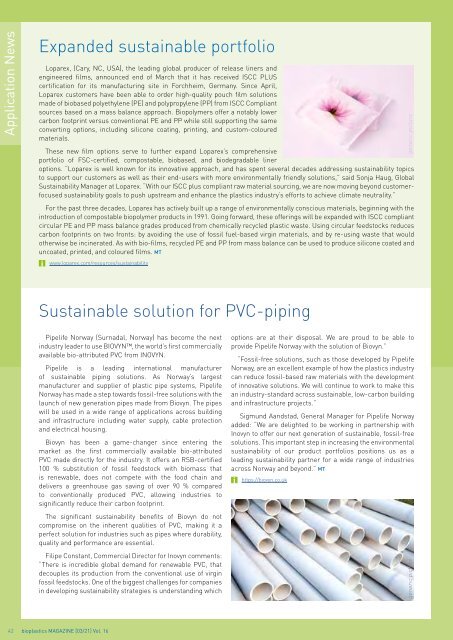issue 03/2021
Highlights: Bottles / Blow Moulding Joining Bioplastics Basics: Carbon Capture
Highlights:
Bottles / Blow Moulding
Joining Bioplastics
Basics: Carbon Capture
- No tags were found...
Create successful ePaper yourself
Turn your PDF publications into a flip-book with our unique Google optimized e-Paper software.
Application News<br />
Expanded sustainable portfolio<br />
Loparex, (Cary, NC, USA), the leading global producer of release liners and<br />
engineered films, announced end of March that it has received ISCC PLUS<br />
certification for its manufacturing site in Forchheim, Germany. Since April,<br />
Loparex customers have been able to order high-quality pouch film solutions<br />
made of biobased polyethylene (PE) and polypropylene (PP) from ISCC Compliant<br />
sources based on a mass balance approach. Biopolymers offer a notably lower<br />
carbon footprint versus conventional PE and PP while still supporting the same<br />
converting options, including silicone coating, printing, and custom-coloured<br />
materials.<br />
These new film options serve to further expand Loparex’s comprehensive<br />
portfolio of FSC-certified, compostable, biobased, and biodegradable liner<br />
options. “Loparex is well known for its innovative approach, and has spent several decades addressing sustainability topics<br />
to support our customers as well as their end-users with more environmentally friendly solutions,” said Sonja Haug, Global<br />
Sustainability Manager at Loparex. “With our ISCC plus compliant raw material sourcing, we are now moving beyond customerfocused<br />
sustainability goals to push upstream and enhance the plastics industry’s efforts to achieve climate neutrality.”<br />
For the past three decades, Loparex has actively built up a range of environmentally conscious materials, beginning with the<br />
introduction of compostable biopolymer products in 1991. Going forward, these offerings will be expanded with ISCC compliant<br />
circular PE and PP mass balance grades produced from chemically recycled plastic waste. Using circular feedstocks reduces<br />
carbon footprints on two fronts: by avoiding the use of fossil fuel-based virgin materials, and by re-using waste that would<br />
otherwise be incinerated. As with bio-films, recycled PE and PP from mass balance can be used to produce silicone coated and<br />
uncoated, printed, and coloured films. MT<br />
www.loparex.com/resources/sustainability<br />
generic picture<br />
Sustainable solution for PVC-piping<br />
Pipelife Norway (Surnadal, Norway) has become the next<br />
industry leader to use BIOVYN, the world’s first commercially<br />
available bio-attributed PVC from INOVYN.<br />
Pipelife is a leading international manufacturer<br />
of sustainable piping solutions. As Norway’s largest<br />
manufacturer and supplier of plastic pipe systems, Pipelife<br />
Norway has made a step towards fossil-free solutions with the<br />
launch of new generation pipes made from Biovyn. The pipes<br />
will be used in a wide range of applications across building<br />
and infrastructure including water supply, cable protection<br />
and electrical housing.<br />
Biovyn has been a game-changer since entering the<br />
market as the first commercially available bio-attributed<br />
PVC made directly for the industry. It offers an RSB-certified<br />
100 % substitution of fossil feedstock with biomass that<br />
is renewable, does not compete with the food chain and<br />
delivers a greenhouse gas saving of over 90 % compared<br />
to conventionally produced PVC, allowing industries to<br />
significantly reduce their carbon footprint.<br />
The significant sustainability benefits of Biovyn do not<br />
compromise on the inherent qualities of PVC, making it a<br />
perfect solution for industries such as pipes where durability,<br />
quality and performance are essential.<br />
Filipe Constant, Commercial Director for Inovyn comments:<br />
“There is incredible global demand for renewable PVC, that<br />
decouples its production from the conventional use of virgin<br />
fossil feedstocks. One of the biggest challenges for companies<br />
in developing sustainability strategies is understanding which<br />
options are at their disposal. We are proud to be able to<br />
provide Pipelife Norway with the solution of Biovyn.”<br />
“Fossil-free solutions, such as those developed by Pipelife<br />
Norway, are an excellent example of how the plastics industry<br />
can reduce fossil-based raw materials with the development<br />
of innovative solutions. We will continue to work to make this<br />
an industry-standard across sustainable, low-carbon building<br />
and infrastructure projects.”<br />
Sigmund Aandstad, General Manager for Pipelife Norway<br />
added: “We are delighted to be working in partnership with<br />
Inovyn to offer our next generation of sustainable, fossil-free<br />
solutions. This important step in increasing the environmental<br />
sustainability of our product portfolios positions us as a<br />
leading sustainability partner for a wide range of industries<br />
across Norway and beyond.” MT<br />
https://biovyn.co.uk<br />
generic picture<br />
42 bioplastics MAGAZINE [<strong>03</strong>/21] Vol. 16


















